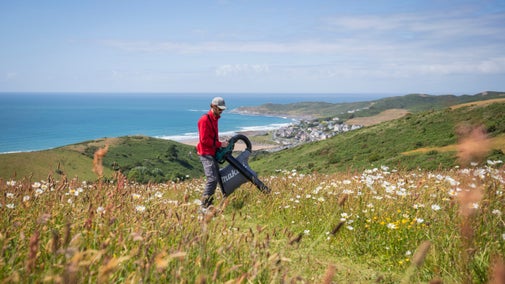
Discover more at Woolacombe
Find out how to get to Woolacombe, where to park, the things to see and do and more.

There are many good reasons why Woolacombe is perhaps the best known of North Devon’s beaches, and was voted Britain’s best beach in 2015 and 2016. From its ideal surfing conditions to its array of rock pools, find out more about what you can see and do here.
Woolacombe’s three-mile stretch of golden sand is a haven for surfers and bodyboarders, from beginners through to experts. If you’re new to surfing you’ll find a selection of surf schools here ready to get you up and riding your first wave.
If it’s very windy and the waves are messy maybe try heading to the far end of the beach at Putsborough where it’s more sheltered from southerly and south-westerly wind.
In March 2022 North Devon was formally announced as the 12th World Surfing Reserve alongside iconic surfing locations across the world. The Reserve is the first of its kind in the UK, and the second in Europe.
If you don’t fancy getting into the water then there are plenty of rock pools here to explore, teeming with wildlife. Take your fishing net and search for crabs, starfish, barnacles, sea anemones and many other rock-pool-dwelling creatures.
The smaller Combesgate Beach close to Woolacombe has lots of family-friendly rock pools to explore.

If your day on the beach has worked up an appetite then head up to the Porthole Café (not National Trust) on Marine Drive, overlooking the dunes, for a selection of artisan sandwiches, cakes and local dairy ice cream.
This café building was part-funded by the European Agricultural Fund for Rural Development alongside the National Trust. It also encompasses accessible toilets and showers which have proved very popular with watersports users.
Or, if you have been out exploring the coastline, pop into Town Farmhouse tea-rooms in Mortehoe village to discover an array of homemade cakes and refreshments. situated in a charming 19th century farmhouse this eco-focused tea-room has a a wonderful Vegetarian and Vegan Menu.
We care for much of the surrounding area, including Morte Point, Woolacombe Down and Baggy Point off in the distance.
The headland at Morte Point has lots of great picnic spots with open views over Woolacombe Bay and out to Lundy Island. The grass is short but you may have to share your meal with the sheep. Visit the pretty village of Mortehoe to start and end your exploration.
Woolacombe Down is a nice quiet spot away from the crowds. Take your binoculars for a chance to spot peregrine falcons, buzzards, Dartford warblers and stonechats. Exmoor ponies can often be seen grazing there too. A National Trust car park can be found at the top of Challacombe hill, it is free for members and is a great starting point for an exploration. The carpark can be found opposite Little Roadway farm campsite, EX34 7HL. Grid Reference: SS 46641 42341 What3Words: slicer.talkative.tight
There are also family events running throughout the year so keep an eye on our website or pop into the Woolacombe Tourist Information Centre for further information.

Find out how to get to Woolacombe, where to park, the things to see and do and more.

The European Agricultural Fund for Rural Development (EAFRD) finances the EU's contribution to rural development programmes (RDPs).
Discover how the National Trust protects and preserves the Woolacombe sand dunes, along with the surrounding coastline and countryside.

All-terrain mobility scooters, called Trampers, allow you to enjoy a great day out at Woolacombe even if you have difficulty walking. Find out more about how to hire one.

Discover the 890 miles of beautiful coastline in our care. Plan your next coastal adventure, whether you want to explore soft, sandy beaches or rugged, windswept cliffs.

While canoeing and kayaking are great ways to experience nature and keep fit, they can be dangerous if you don't follow the guidelines. Learn how to stay safe with our advice and guidance.

Try out the ‘50 things to do before you’re 11¾’ activities children can enjoy by the sea, from paddling or swimming, to catching crabs and skimming stones.

The beaches and coast along the rugged Devon landscape are ideal for a day out with the family. Take a coastal walk in the fresh air or enjoy games on the beach.
